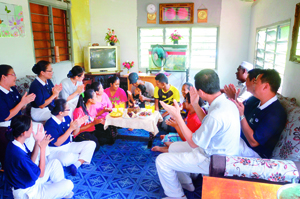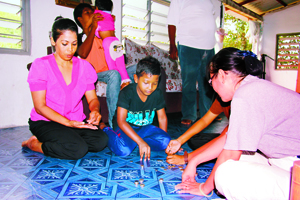

| Better Days Dawning | ||||
| By Tan Yun Ru Translated by Tang Yau-yang | ||||
They were once so poor that they didn’t always have enough food to eat. They needed aid to get by. Now they save a little money each day to help others. They believe that a brighter future lies ahead.
Nur Alya walked home after school let out, across a hillside on Langkawi, an island off the coast of Kedah, Malaysia. Inside her front door, she took some spare change from her pocket and dropped it into a coin bank. Her younger sister, Nurul Nabila, came in a little later and did the same. Though they did not deposit much, dropping a few coins into the bank upon coming home was routine for everyone in the family. Just a few years ago, the girls’ parents, Abdul Hamid and Normimi, could hardly provide for the family. But this family has experienced a remarkable turnaround—from people who needed aid to people who are providing aid to others. In 2006, Abdul Hamid had a kidney stone operation and was subsequently bedridden for two years. He lost his job, and Normimi was forced to become the breadwinner for the family. They could not continue to pay rent, so the family of eight moved into a wooden shed which their relatives and friends had built for them. “I was desperate at the time, thinking that we’d live in poverty for life,” Normimi recalled. Normimi worked as a cleaner at a hotel while also taking care of her children and husband. She was overstretched in all directions. She even lost her job for a while. In 2008, Abdul Hamid needed another operation; Tzu Chi volunteers learned of their plight and started visiting them. Volunteer Chang Sau Kam (曾秀金) remembered one visit clearly: Normimi was at the hospital looking after Abdul Hamid, and the children said that they had not eaten in a couple of days. “Each time they came,” Normimi said of the volunteers, “they would tell me to be strong and to believe that Allah would bless me, that my children would work hard and take care of me in the future, and that a good life was in store for me. I would reflect on their words before I fell asleep each night. Gradually their words sank in, and I came to terms with my circumstances.” She added that each time the volunteers visited, they gave her and her family money, daily necessities, and spiritual support. It was like a shot in the arm for them. The shed they lived in was very small, not quite 70 square feet. It almost always flooded after a rain. The year after Tzu Chi volunteers started visiting them, the couple applied to the government for aid for a better house. They later moved into a brick home on higher ground. They could finally sleep soundly through rainy nights. Even so, Normimi’s work was not always stable. She sometimes had no money for her children’s tuition. “Once I didn’t pay my tuition because I didn’t have the heart to ask Mom for money,” recalled Nur Alya as she wiped away her tears. “I stalled until the end of the month. When I finally told her, she asked Tzu Chi volunteers for help. Volunteers went to my school for me. I was so glad when I saw them there to help us.” The volunteers informed the school of the quandary that Nur Alya’s family was in, and the school administration waved the tuitions and fees for her and her siblings. “Volunteers told me not to worry about money. They said that they would help us and encouraged me to focus on my studies,” Nur Alya said. “I took their words to heart and stopped worrying.” Eventually, Abdul Hamid recovered enough to return to work. Since he and his wife were both working, he asked Tzu Chi to stop giving them monetary assistance, which the volunteers had been doing for three years. However, he did welcome them to continue to visit his home and cheer his family on. “Tzu Chi has lifted us up. It’s as if they had watered us, fertilized us and brought us back to life,” the master of the family said. At a Tzu Chi aid distribution, Abdul Hamid and his family learned about the origin of Tzu Chi—how the foundation had started in Taiwan with 30 housewives each saving 50 cents (then 1.2 US cents) in a bamboo coin bank every day to help the needy. Inspired, they decided to start saving coins to do good for others. “We used to receive others’ help, so why not help others now?” Abdul Hamid remarked. “If Nur Alya puts in ten sen a day, Nurul Nabila puts in ten, Nabil ten, and Normimi and I ten each, then we’ll have 50 sen a day,” Abdul Hamid said. “That’s 15 ringgits [US$4.30] a month that we can give to Tzu Chi to help needy people.”
For more than three years now, putting pocket change into a coin bank has become the first thing Abdul Hamid’s children do when they come home from school. Following the same spirit, Abdul Hamid fashioned another coin bank out of a beverage bottle to put away money for emergency. Having lived through poverty, he knew what it was like not to have any money. He wanted to teach his children the importance of saving for a rainy day. Syawal, 21, their oldest child, is a yacht pilot by day and an airport guard by night. He has worked since he graduated from high school to help support the family. He works hard, and he encourages his siblings to study hard. He hopes to own a yacht one day and take tourists out himself. “I’ll work toward a better life so my family can live in comfort,” he said. It was heartening for volunteer Lee Ei Ching (李玉箐) to see Syawal and his siblings work toward their goals and dreams. She has accompanied this family since 2008 and has seen them rise from destitution to independence. Their success makes her as happy as if they were her own family. “Life can’t always be a smooth ride—there are bound to be ups and downs. When people are down, they need others to give them care to help them through.” Tzu Chi volunteers not only give care recipients financial support, but continually accompany them to help build up their confidence, perseverance, and courage to face life. They do not expect anything in return. The transformation of care recipients from people-who-receive to people-who-give is the best reward for them…just as is shown by the story of Normimi and her family. |













|


